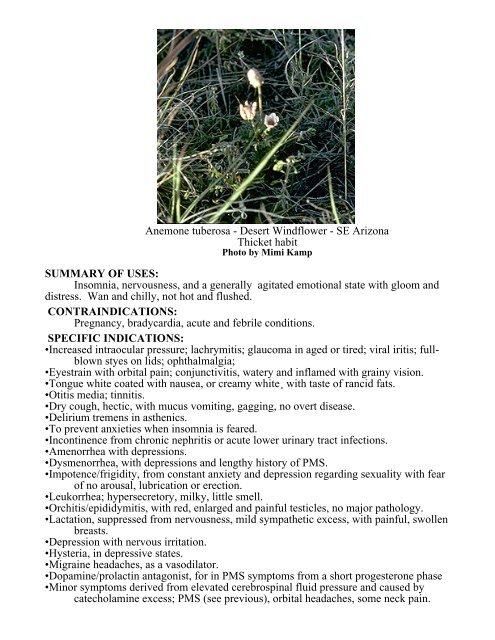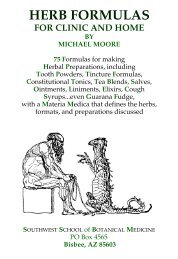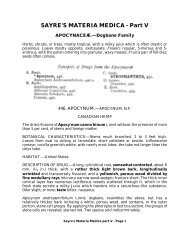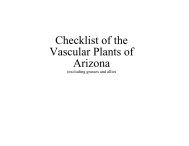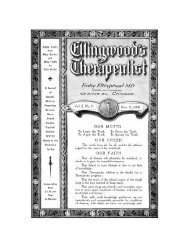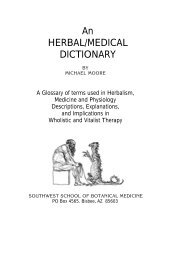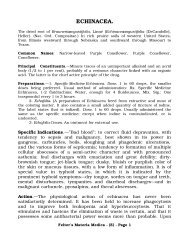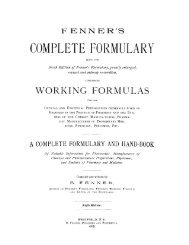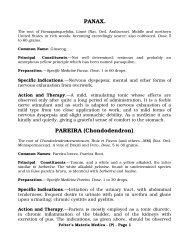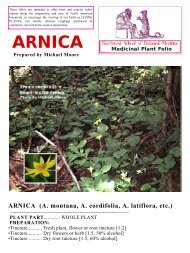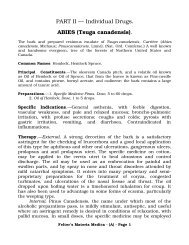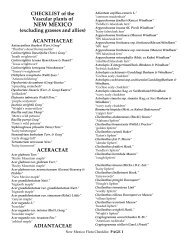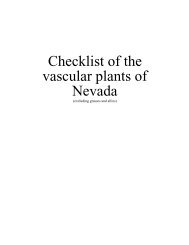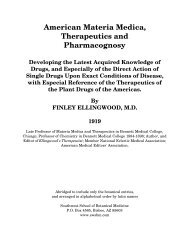Anemone pulsatilla Folio - Southwest School of Botanical Medicine
Anemone pulsatilla Folio - Southwest School of Botanical Medicine
Anemone pulsatilla Folio - Southwest School of Botanical Medicine
Create successful ePaper yourself
Turn your PDF publications into a flip-book with our unique Google optimized e-Paper software.
<strong>Anemone</strong> tuberosa - Desert Windflower - SE Arizona<br />
Thicket habit<br />
Photo by Mimi Kamp<br />
SUMMARY OF USES:<br />
Insomnia, nervousness, and a generally agitated emotional state with gloom and<br />
distress. Wan and chilly, not hot and flushed.<br />
CONTRAINDICATIONS:<br />
Pregnancy, bradycardia, acute and febrile conditions.<br />
SPECIFIC INDICATIONS:<br />
•Increased intraocular pressure; lachrymitis; glaucoma in aged or tired; viral iritis; fullblown<br />
styes on lids; ophthalmalgia;<br />
•Eyestrain with orbital pain; conjunctivitis, watery and inflamed with grainy vision.<br />
•Tongue white coated with nausea, or creamy white¸ with taste <strong>of</strong> rancid fats.<br />
•Otitis media; tinnitis.<br />
•Dry cough, hectic, with mucus vomiting, gagging, no overt disease.<br />
•Delirium tremens in asthenics.<br />
•To prevent anxieties when insomnia is feared.<br />
•Incontinence from chronic nephritis or acute lower urinary tract infections.<br />
•Amenorrhea with depressions.<br />
•Dysmenorrhea, with depressions and lengthy history <strong>of</strong> PMS.<br />
•Impotence/frigidity, from constant anxiety and depression regarding sexuality with fear<br />
<strong>of</strong> no arousal, lubrication or erection.<br />
•Leukorrhea; hypersecretory, milky, little smell.<br />
•Orchitis/epididymitis, with red, enlarged and painful testicles, no major pathology.<br />
•Lactation, suppressed from nervousness, mild sympathetic excess, with painful, swollen<br />
breasts.<br />
•Depression with nervous irritation.<br />
•Hysteria, in depressive states.<br />
•Migraine headaches, as a vasodilator.<br />
•Dopamine/prolactin antagonist, for in PMS symptoms from a short progesterone phase<br />
•Minor symptoms derived from elevated cerebrospinal fluid pressure and caused by<br />
catecholamine excess; PMS (see previous), orbital headaches, some neck pain.


